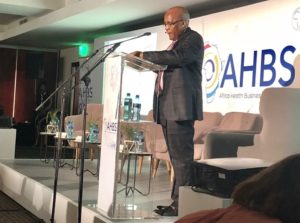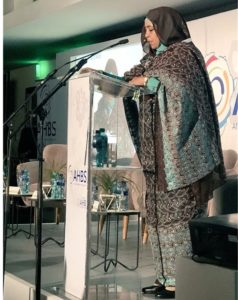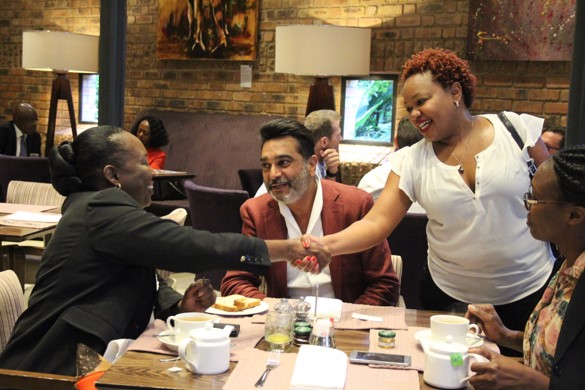Annual Africa Health Business Symposium 2018 focuses on achieving Universal Health Coverage (UHC) in Africa
Africa has recorded a high increase in health expenditure over the last two decades with an associated increase in out-of-pocket expenditure for primary healthcare services. Access to quality healthcare plays a key role in achieving sustainable development goals (SDGs) and boosting economic growth. Integration of UHC as a goal in the national health strategies of African countries is becoming increasingly critical as the continent continues to bear the highest disease burden, an increasing population and lack of a strong health workforce to meet healthcare demands.
Africa Health Business Limited held the 3rd Africa Health Business Symposium dubbed AHBSIII at Hyatt Regency Hotel in Johannesburg , South Africa from 8th – 9th October 2018. The two day conference was themed “Achieving UHC in Africa: Stronger Together.” The conference brought together more than 300 delegates from over 50 countries, majority being African. A major expectation for the attendees was learning from various countries’ experiences in implementing UHC and the various policies and financing mechanisms required for UHC to be achieved.
The South Africa minister for health Dr. Pakishe Aaron Motsoaledi opened the conference by welcoming the attendees to South Africa. He further thanked the AHBS team for choosing South Africa to be the host country for the third annual Africa Health Business Symposium. In his opening remarks, he said “The concept of achieving Universal Health Coverage by 2022 is important. We should aim at reducing the burden on health systems in Africa”.


H.E. Amira Elfadil Commissioner for Social Affairs, African Union, said the public sector must work in unity with the private sector and commit to improving health outcomes for all, not just the middle, upper – middle and elite classes that the private sector mainly serves. “Universal Health Coverage, will help us narrow gross inequalities among people who require access to quality healthcare and affordable medicines.”
“Implementing Universal Health Coverage is only possible when we train local skills and bring in the right medical equipment. The private sector is well positioned to launch such initiatives through Public – Private Partnerships or tailored agreements” Dr. Mohamed El Sahili, CEO Medland Health Services.
Dr. Amit N. Thakker, emphasised that quality should be the foundation and basis of UHC. “Quality is the right treatment for the right person at the right time. The private sector has the opportunity to provide care more cost- effectively”, said Dr. Thakker, the chairman of Kenya Healthcare Federation (KHF).
There was an emphasis on strengthening public-private partnerships for achieving UHC. Intra Health CEO, Mr. Pape Gaye, emphasised that leveraging PPP in Africa can help achieve UHC especially establishing the right human resource capacity.
Key pointers discussed as a way forward were: PPPs, human resources for health, as well as quality and affordable medicines. There was unanimous agreement that African governments should consider working through PPPs to strengthen health literacy and health systems to increase access to quality health services and improve on financial protection schemes.

UHC can be achieved through learning from experiences of countries that have successfully implemented or are in the processes of successful implementation of UHC. Learning and adopting evolving innovations will give better ideas of effective healthcare models that are tailored to each country’s needs. Diversified approaches will create the road map to significantly expand the number of people covered by risk pooling arrangements, with substantial benefits to health care, optimizing resource use, maximizing results and “leaving no one behind.”
Dr. Toda Takao, Vice President, human security and global health – Japan International Cooperation Agency (JICA) – spoke of his own country’s post-World War II experience in implementing UHC. He said that it was the key economic driver to the country’s recovery from devastation by the conflict. Takao emphasized these three points: UHC is a nation-building issue, UHC is a pre-condition to economic growth and UHC must involve all stakeholders in the process or it will neither be achieved nor sustained.
Kenya Healthcare Federation was proud to partner with Africa Health Business Limited (a KHF Member) in making the event a success. KHF was represented the chairman Dr. Amit Thakker and two directors namely: Dr. Daniella Munene and Dr. Anastacia Nyalita. There were other KHF members who attended and exhibited at the event, including Corvus Health, IntraHealth International, Amref Health, General Electric and PharmaAccess Foundation. In his closing remarks, Dr. Thakker applauded the conference as remarkable, fruitful and very informative. “We celebrate three key successes borne out of the symposium: Meaningful interaction and engagement with dignitaries, tangible progress on unification of the private sector in South Africa under a federation with good will from the Department of Health, and a commitment from the private health sector to support African Union to achieve Agenda 63.
Many delegates visited a General Electric (GE) medical innovation center that features the latest high-tech ultra sound scanners, infant incubators and other ultra modern medical equipment. GE considers this center as part of a solution toward African development by fostering home-grown solutions. This includes an education and training center where expert healthcare providers train rural, community-level healthcare workers who are usually mostly untrained in the use of new technological advancements. There was unanimous agreement that the next AHBS (AHBSIV) will be held in Ethiopia.
